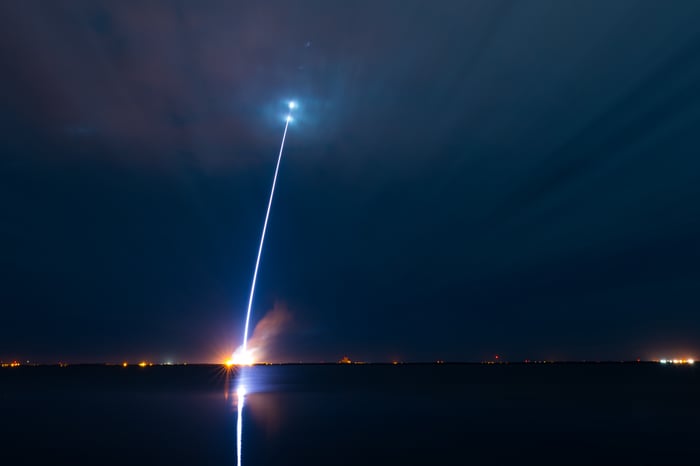Trading accounts
Platforms
News
We provide the latest news
from the world of economics and finance
We provide the latest news from the world of economics and finance
Jeff Bezos has finally done it. He's finally reached space with an honest-to-goodness orbital-class rocket.
Ten years ago, Bezos ignited a feud with SpaceX founder Elon Musk when his Blue Origin rocket company launched a suborbital New Shepard rocket to the edge of space and then landed it back on Earth. SpaceX was still trying to get its Falcon 9 rockets to land on a barge at sea back then. When Bezos boasted that he had landed first, therefore, Musk was quick to point out that the Blue Origin rocket lacked the ability to orbit Earth, so Blue Origin's accomplishment wasn't nearly as big a deal as it was made out to be.
Start Your Mornings Smarter! Wake up with Breakfast news in your inbox every market day. Sign Up For Free »
But this latest one definitely is.
New Glenn safely reached its intended orbit during today's NG-1 mission, accomplishing our primary objective. The second stage is in its final orbit following two successful burns of the BE-3U engines. The Blue Ring Pathfinder is receiving data and performing well.
-- Blue Origin (@blueorigin) January 16, 2025
We lost the... pic.twitter.com/MmDlCb6AVj
In the wee morning hours of Thursday, Jan. 16, Blue Origin launched its first New Glenn orbital-class rocket to space. The 322-foot rocket flew straight and true, reaching orbit on its first attempt, and its second stage deposited a prototype Blue Ring space tug in orbit. The rocket's reusable first stage then attempted a SpaceX-like barge landing, but missed its target and was lost at sea.
Well, drat on that. Still, it took SpaceX five attempts to work out the kinks on at-sea landings. It would have been more surprising if Blue Origin had succeeded on its first attempt. It will figure this out eventually. And once it does, the world will have its second reusable heavy-lift rocket -- and SpaceX will have a new rival to contend with.
Rated to launch 45 metric tons of payload to low Earth orbit (LEO) in an expendable configuration, and reported to cost about $70 million per launch, Blue Origin's rocket poses serious competition to SpaceX and its workhorse Falcon 9 reusable rocket. SpaceX's maximum payload to LEO, when not on a reusable mission, is only 22 metric tons. (Both rockets carry less payload when assigned to reusable missions, because they need to carry extra fuel for landing.)
And SpaceX advertises a launch cost of $69.8 million.
Granted, Blue Origin poses an even bigger threat to Lockheed Martin (NYSE: LMT) and Boeing (NYSE: BA) and their United Launch Alliance (ULA) joint venture, which charges $110 million for Vulcan rocket launches. Airbus' (OTC: EADSY) Arianespace charges $77 million for an Ariane 62 launch, and is probably worried, too.
Still, unless and until SpaceX lowers its price to compensate, or gets its new Starship rocket operational, it will be trying to sell customers on a rocket that costs the same as Blue Origin's New Glenn, but carries only half as much cargo.

Nor is this the only reason Blue Origin's success may leave Musk quaking in his space-boots. The biggest significance of Blue Origin getting New Glenn off the ground, you see, is that now it can begin flying Kuipersat internet satellites to orbit for Amazon (NASDAQ: AMZN).
Amazon hopes to use Kuipersats build its own satellite internet system to compete with SpaceX's Starlink. Amazon faces a July 2026 deadline for getting its first 1,600 satellites in orbit, though, or it risks the Federal Communications Commission (FCC) pulling its license to operate the constellation. This means that, over the next 18 months, Amazon must somehow launch nearly 90 satellites to orbit per month, every month, from now through July 2026.
To help make that happen, Amazon has signed launch contracts with everyone from Arianespace to ULA to SpaceX itself -- 92 contracts in all. Logically, though, Amazon would prefer to do as much business as possible with Blue Origin. (Seeing as the two companies share a founder in Jeff Bezos, it's likely Blue Origin will give Amazon a good price.) Plus, now that Blue Origin possesses a rocket that can launch 600-kilogram Kuipersats into orbit, 75 at a time, Amazon has a second huge reason to favor Blue Origin over other launch providers.
Long story short, with 10 New Glenn launches planned this year, and a good measure of assistance from Arianespace, ULA, and SpaceX, there's a very good chance that Amazon will meet its deadline, and deliver Project Kuiper on time in 2026.
And Amazon has Blue Origin to thank for it.
Before you buy stock in Amazon, consider this:
The Motley Fool Stock Advisor analyst team just identified what they believe are the 10 best stocks for investors to buy now… and Amazon wasn’t one of them. The 10 stocks that made the cut could produce monster returns in the coming years.
Consider when Nvidia made this list on April 15, 2005... if you invested $1,000 at the time of our recommendation, you’d have $843,960!*
Stock Advisor provides investors with an easy-to-follow blueprint for success, including guidance on building a portfolio, regular updates from analysts, and two new stock picks each month. The Stock Advisor service has more than quadrupled the return of S&P 500 since 2002*.
Learn more »
*Stock Advisor returns as of January 21, 2025
John Mackey, former CEO of Whole Foods Market, an Amazon subsidiary, is a member of The Motley Fool's board of directors. Rich Smith has no position in any of the stocks mentioned. The Motley Fool has positions in and recommends Amazon. The Motley Fool recommends Lockheed Martin. The Motley Fool has a disclosure policy.
The views and opinions expressed herein are the views and opinions of the author and do not necessarily reflect those of Nasdaq, Inc.